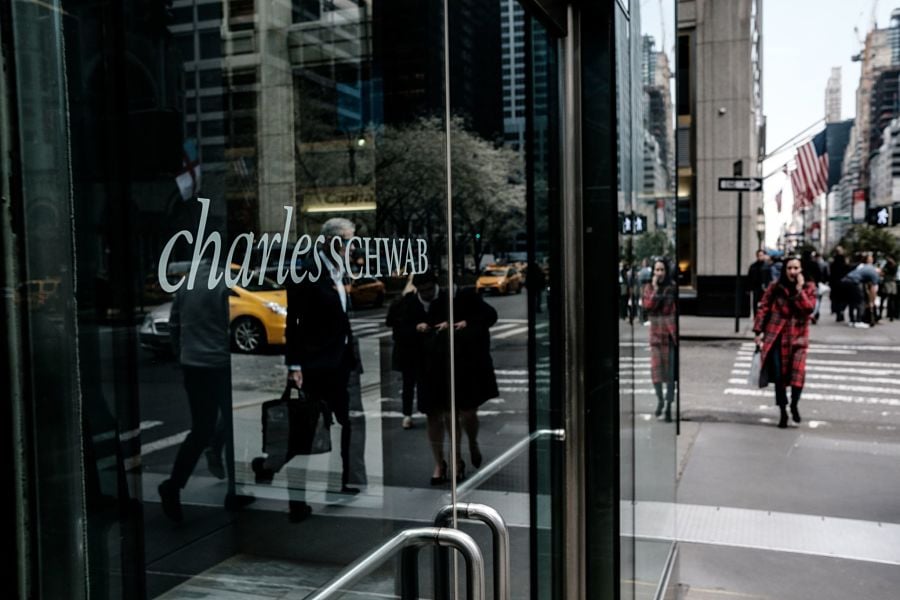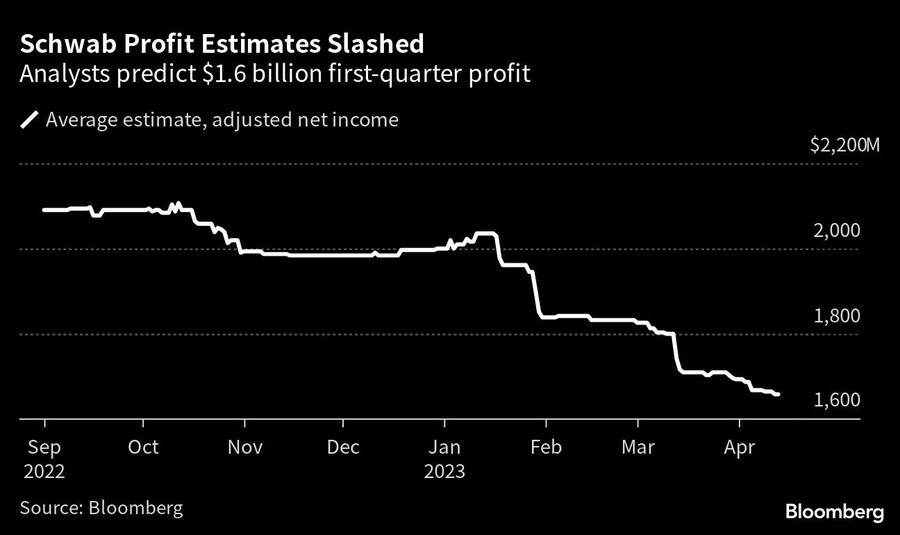

Charles Schwab Corp. stunned Wall Street in 2019 by slashing trading commissions to zero, forcing its competitors to adapt. The move amounted to a big bet that its bank — rather than its well-known discount brokerage — would keep driving profits.
For a while, it worked to perfection. The pandemic hit, interest rates were pinned near historic lows, and Schwab raked in billions as the fees it had forsaken were offset by what the company earned from its banking operation.
But last month’s collapse of three U.S. banks, the industry’s worst crisis since 2008, has turned that wager on its head.
Now Schwab, the biggest publicly traded U.S. brokerage, faces one of the most painful moments in its 50-year history. After a rapid surge in interest rates, deposits sank while unrealized losses swelled. The stock plunged 33% in March, its worst month since 1987.
Investors will be looking for signs of Schwab’s longer-term prognosis Monday when it reports first-quarter results. In recent weeks, Wall Street analysts sharply reduced their profit estimates.

Deposits are a key focus.
If they decline too far, Schwab could eventually be forced to sell securities at a loss. Chief Executive Walt Bettinger, 62, and billionaire founder Charles Schwab, 85, issued two joint statements in recent weeks to reassure investors that there’s a “near-zero” chance of that. Last Thursday, they touted $53 billion of client assets that arrived in March, the second-largest for that month on record.
“What we’ll be most keen to see is: Did the pace of deposits leaving accelerate?” said Bloomberg Intelligence analyst Neil Sipes. “Can they quantify how much more there is to go?”
Some investors decided not to wait. Rajiv Jain’s GQG Partners, which had been among Schwab’s top 15 shareholders at year-end, sold its entire $1.4 billion stake during last month’s turmoil, the Financial Times reported Friday.
“We didn’t see an existential risk but they were caught up in the sentiment around banks,” Mark Barker, head of international at the investment firm, told the FT. “With all the inflows to money-market funds Charles Schwab is losing deposits revenue.”
Schwab defies easy classification. Known for pioneering cheap stock trading, it grew into one of the largest U.S. banks. The firm weathered seismic changes over five decades, including the dot-com bust, the dawn of low-cost index products and the era of free trading it ushered in.
Cash has become even more important since then.
While the move to zero-fee trading paved the way for Schwab's $26 billion purchase of TD Ameritrade, it also knocked out an income stream that totaled $763 million, or 7.5% of revenue, in 2018.
Because Schwab generates most of its money from customer funds idling in low-yielding accounts — which it “sweeps” into its bank arm — the firm needed somewhere to invest incoming cash as trading surged.
Like Silicon Valley Bank, the largest of the three lenders that imploded last month, Schwab plowed into debt that will take five years or more to mature. Such securities, backed by the U.S. government, are supposed to be among the safest available — a seemingly good fit for a company known for its conservative approach to money management.
The risk was that interest rates could rise.
That’s exactly what started to happen in early 2022, as the Federal Reserve began to hike aggressively. The investments are now underwater, though Schwab won’t have to book a loss unless it’s forced to sell them.
“We have taken relatively little risk in our portfolio,” founder Schwab and Bettinger said in a March 23 statement, noting that more than 80% of deposits are FDIC-insured. Two weeks later, they predicted that the migration to higher-yielding investments would ease. “That trend eventually reaches a plateau,” they said.
Company spokeswoman Mayura Hooper said the firm offers many ways for clients to make the most of their cash.
“Cash sweep is just the starting point for uninvested cash at Schwab,” Hooper said in a statement.
Whether the remaining deposits stay put will depend to a degree on the big independent advisers that buttress Schwab’s business. They’re increasingly focused on getting the best returns for clients’ cash.
Charles Sachs, chief investment officer at Kaufman Rossin Wealth, is among them. He moves customer money from Schwab sweep accounts into its higher-yielding money-market funds on almost a daily basis.
“This is a frustration,” Sachs said. “It creates unnecessary work for us.”
At Fidelity Investments, some sweep accounts earn more than 4%, with no extra effort required. Schwab offers 0.45%.
“Nobody likes to be sitting, not earning money on your dollars when you could be,” Sachs said, adding that he complained to Schwab. “They’re going to need to do something.”
Jon Ulin, managing principal of Ulin & Co., a private wealth adviser in Boca Raton, Florida, said that some clients have asked questions about Schwab’s balance sheet and plummeting share price. He said Schwab’s business is sturdy.
“I don’t have any concern at all,” he said. “The U.S. government would intervene if something got worse.”
In January, Schwab told investors that it believed the firm can increase profitability in coming years as low-yielding assets mature, freeing it up to invest in securities with higher yields. But this strategy hinges on a number of assumptions, particularly that deposit flight will ebb.
The firm’s leaders estimated in January that interest-earning assets had an additional 8% to 12% to fall from year-end levels, in part because they looked to the last interest-rate hiking cycle, which ended in 2019, for a template.
They also assumed the firm’s high-cost borrowing would be temporary.
To shore up its business in the short term, Schwab has been relying on loans. The firm said it had $100 billion in cash flow and more than $300 billion available from the Federal Home Loan Bank system, among other options.
It has already drawn from that pool.
Schwab became the largest borrower from its local branch of the system, the Dallas FHLB, in 2022, according to regulatory filings. Schwab borrowed $12.4 billion from it last year, and an additional $13 billion so far this year, according to its annual report.
Against that backdrop, Schwab continued to reward shareholders by increasing dividends and repurchasing shares.
Wall Street analysts are still confident in Schwab. Most have the equivalent of a “buy” rating on the company’s stock. In yet another sign of Schwab’s unique place in the U.S. financial system, some analysts who cover it primarily focus on brokerages and exchanges — not big banks. In its scale and layout, Schwab remains a bit of an anomaly.

After a two-year period of inversion, the muni yield curve is back in a more natural position – and poised to create opportunities for long-term investors.

Meanwhile, an experienced Connecticut advisor has cut ties with Edelman Financial Engines, and Raymond James' independent division welcomes a Washington-based duo.

Oregon-based Eagle Wealth Management and Idaho-based West Oak Capital give Mercer 11 acquisitions in 2025, matching last year's total. “We think there's a great opportunity in the Pacific Northwest,” Mercer's Martine Lellis told InvestmentNews.

Osaic has now paid $17.2 million to settle claims involving former clients of Jim Walesa.

Osaic-owned CW Advisors has added more than $500 million to reach $14.5 billion in AUM, while Apella's latest deal brings more than $1 billion in new client assets.
Orion's Tom Wilson on delivering coordinated, high-touch service in a world where returns alone no longer set you apart.
Barely a decade old, registered index-linked annuities have quickly surged in popularity, thanks to their unique blend of protection and growth potential—an appealing option for investors looking to chart a steadier course through today's choppy market waters, says Myles Lambert, Brighthouse Financial.
